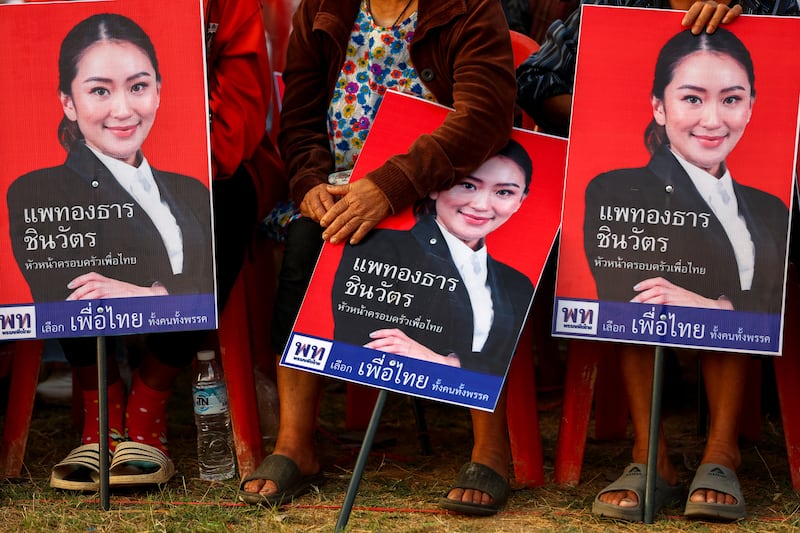Thailand’s ruling Pheu Thai may just survive a court-ordered disbandment, this time, analysts said, adding that this was a wake-up call to the party that should not take its coalition’s stability for granted.
The Thai Election Commission (EC), which is investigating whether the party illegally took advice from non-member and former Prime Minister Thaksin Shinawatra, said it would take at least a month to finish its probe.
The poll body said it had set up an investigative committee after it received petitions saying Pheu Thai had violated the law that says political parties must remain independent, failing which they would be disbanded.
Prime Minister Paetongtarn Shinawatra, who is from Pheu Thai and Thaksin’s daughter, said she was not worried about the petitions, with analysts such as Thanaporn Sriyakul of Kasetsart University noting that she may not have much to be concerned about – for now.
“In principle, it doesn’t seem to have reached the point where Pheu Thai could be dissolved, but the party cannot afford to be complacent,” Thanaporn, chairman of Kasetsart University’s Political Science Association, told BenarNews.
“For accusations of party dominance by a ‘big boss’ like Thaksin, there must be concrete evidence. Therefore, it is unlikely that any party will be dissolved over this,” he added.
If the EC finds that the petitions against Pheu Thai have merit, it will forward the case to the Constitutional Court, which will decide.
Thai courts have been used to end political parties at least 17 times since 2007.
The Pheu Thai Party is seen as a replacement for the People's Power Party (PPP), which was dissolved by the Constitutional Court. And the People's Power Party had replaced Thaksin's Thai Rak Thai Party (TRT), which met a court-ordered end.
In August, the Constitutional Court ordered the progressive Move Forward Party, which had won the most seats in the national election, to dissolve.
The court also banned its top leaders from politics for 10 years, for promising during the 2023 electoral campaign that they would abolish the country’s strict royal defamation law.
RELATED STORIES
[ Military-backed parties still meddling in Thai politics: Zachary AbuzaOpens in new window ]
[ Thailand’s ruling alliance shifts as PM Paetongtarn finalizes cabinetOpens in new window ]
[ Paetongtarn Shinawatra’s nomination for Thai PM reopens family dynastyOpens in new window ]
The petitioners demanding Pheu Thai's dissolution include some of the country's conservative forces, including those with strong anti-Thaksin sentiments and who have historically aligned with the military, Thanaporn added.
They are Warong Dechgitvigrom, leader of the Thai Pakdee Party; Ruangkrai Leekitwattana, a member of the Palang Pracharath Party; Nopparuj Worachitwutikul, a former leader of the White Dove Conservative Political Group; and an unnamed individual.
They question Thaksin's alleged involvement in hosting a meeting at his residence on Aug. 14 with leaders of the ruling coalition government after his ally Srettha Thavisin's court-ordered dismissal as prime minister over a questionable cabinet appointment.
Thaksin’s actions, the petitions said, suggested he was exercising influence or direct involvement in the activities of Pheu Thai and its coalition partners.

The ex-PM is a populist yet divisive figure in Thai politics. He is seen by some observers as a power broker for his daughter Paetongtarn, who became PM after Srettha was dismissed.
Thaksin was elected prime minister in 2001 until he was forced from office in 2006 by a military coup. He fled Thailand in 2008 to escape a prison term for charges that he maintains were politically motivated.
After living in exile, he returned to Thailand last year when Pheu Thai regained control of the government and Srettha was installed as PM.
But it has not been smooth sailing for Pheu Thai’s coalition government, first with the investigation and eventual dismissal of Srettha and the latest petitions for the party's dissolution.
However, political analyst Olarn Thinbangtieo, from Burapha University, said the non-military elite still needed Pheu Thai on the political scene and that it will ensure the party survives.
“I don’t believe Pheu Thai will be dissolved because the political elite still needs the party to continue playing a role in Thai politics,” Olarn, an associate professor of political science, told BenarNews.
“The EC is merely processing these complaints to avoid accusations of negligence.”
‘A political game’
Meanwhile, Deputy Prime Minister Phumtham Wechayachai told reporters that unending court challenges and other complaints could have economic consequences.
“The EC is doing its job, but it’s unsettling that any complaint, no matter how minor, can become a major issue. These constant accusations against the Prime Minister create uncertainty, which affects investor confidence and harms the economy,” he said.
“But as for the party, we’re not worried. The coalition partners are also unconcerned, and we are ready to explain ourselves.”
As Paetongtarn told reporters, “We are not worried.”
EC Secretary-General Sawang Boonmee said that the commission’s aim was to finish the investigation into the petitions in a month.
“The EC will complete the investigation within 30 days, with the possibility of 30-day extensions until the process is finished,” he said.
Two young Thais said they believed the attempts to dissolve Pheu Thai were a scheme to gain more say in the government.
“The petition to dissolve Pheu Thai is clearly a political game,” Kittin Likitparinya, a 28-year-old office worker in Bangkok, told BenarNews.
Akkarawut Poomchua, 38, who is an office manager in central Bangkok, said he did not think Pheu Thai would be ordered to disband.
“If it’s not the Orange Party [Move Forward], then I think the rest of the parties will survive,” he told BenarNews.
“The petitions to dissolve Pheu Thai are just tools in the power-sharing game.”
